Nurs 251 exam 7 - Study guides, Class notes & Summaries
Looking for the best study guides, study notes and summaries about Nurs 251 exam 7? On this page you'll find 176 study documents about Nurs 251 exam 7.
Page 4 out of 176 results
Sort by
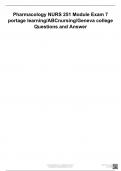
-
Pharmacology NURS 251 Module Exam 7 portage learning/ABCnursing/Geneva college Questions and Answer
- Exam (elaborations) • 16 pages • 2023
-
Available in package deal
-
- $13.49
- + learn more
Pharmacology NURS 251 Module Exam 7 portage learning/ABCnursing/Geneva college Questions and Answer Module 7 Exam - Requires Respondus LockDown Browser + Webcam Question 1 What type of gastric acid is released by the parietal cells? Answer: Hydrochloric Acid (HCl) Question 2 Select the substance below that is a major stimulator for the release of gastric juices. Acetylcholine HCl Substance P Serotonin Question 3 Describe the ro...
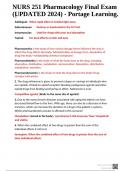
-
NURS 251 Pharmacology Final Exam (UPDATED 2024) - Portage Learning.
- Exam (elaborations) • 17 pages • 2024
-
- $12.99
- + learn more
NURS 251 Pharmacology Final Exam (UPDATED 2024) - Portage Learning. Sublingual: When rapid effect is needed right away Subcutaneous: Destroy or inactivated in the GI Tract Intramuscular: Used for drugs with poor oral absorption Topical: For local effects on skin and eyes Pharmaceutics is the study of how various dosage forms influence the way in which the drug affects the body/ Administration of dosage form, dissolution of drug into body/ manipulating chemical compound. Pharmacokinetics ...
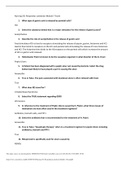
-
Nurs 251 Pharmacology Exam 7
- Exam (elaborations) • 4 pages • 2022
-
- $12.49
- 2x sold
- + learn more
Nurs 251 Pharmacology Exam 7 Nursing 251 Pharmacology Module 7 Exam 1. What type of gastric acid is released by parietal cells? 2. Select the substance below that is a major stimulator for the release of gastric juices? 3. Describe the role of acetylcholine in the release of gastric acid 4. Helicobacter Pylori is known to be the causative organism in what disorder of the G.I tract 5. A Patient has been diagnosed with a peptic ulcer not caused by bacteria. Select the drug below le...
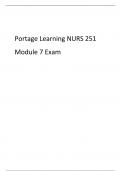
-
Portage Learning NURS 251 Module 7 Exam
- Exam (elaborations) • 9 pages • 2023
-
Available in package deal
-
- $9.49
- + learn more
Portage Learning NURS 251 Module 7 Exam Name the cells responsible for the release of Hydrochloric acid in the stomach. Your Answer: parietal cells Describe the role of acetylcholine in the release of gastric acid. Your Answer: Acetlecholine binds to receptors, promoting the release of gastic acid. For example ach will bind to g cells to promote the secretion of gastic acid. Name the type of bacteria that is the primary cause of peptic ulcers. Your Answer: H. Pylori What does IBS sta...
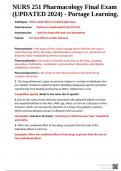
-
NURS 251 Pharmacology Final Exam (UPDATED 2024) - Portage Learning.
- Exam (elaborations) • 17 pages • 2024
-
- $12.99
- + learn more
NURS 251 Pharmacology Final Exam (UPDATED 2024) - Portage Learning. Sublingual: When rapid effect is needed right away Subcutaneous: Destroy or inactivated in the GI Tract Intramuscular: Used for drugs with poor oral absorption Topical: For local effects on skin and eyes Pharmaceutics is the study of how various dosage forms influence the way in which the drug affects the body/ Administration of dosage form, dissolution of drug into body/ manipulating chemical compound. Pharmacokinetics ...
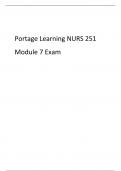
-
Portage Learning NURS 251 Module 7 Exam
- Exam (elaborations) • 9 pages • 2023
- Available in package deal
-
- $9.49
- + learn more
Portage Learning NURS 251 Module 7 Exam Name the cells responsible for the release of Hydrochloric acid in the stomach. Your Answer: parietal cells Describe the role of acetylcholine in the release of gastric acid. Your Answer: Acetlecholine binds to receptors, promoting the release of gastic acid. For example ach will bind to g cells to promote the secretion of gastic acid. Name the type of bacteria that is the primary cause of peptic ulcers. Your Answer: H. Pylori What does IBS sta...
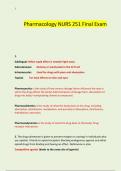
-
NURS 251 Pharmacology Module 1, 2, 3, 4, 5, 6, 7, 8, 9, 10 Exam's and NURS 251 Final Exam Newest Questions and Answers (2023 / 2024) (Verified by Expert)
- Package deal • 10 items • 2023
-
- $40.49
- + learn more
NURS 251 Pharmacology Module 1, 2, 3, 4, 5, 6, 7, 8, 9, 10 Exam's and NURS 251 Final Exam Newest Questions and Answers (2023 / 2024) (Verified by Expert)
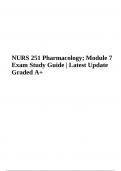
-
NURS 251 Pharmacology; Module 7 Exam Study Guide | Latest Update Graded A+
- Exam (elaborations) • 14 pages • 2023
-
Available in package deal
-
- $19.49
- + learn more
NURS 251 Pharmacology; Module 7 Exam Study Guide (Latest Update Graded A+). GERD Depending on the severity of the disease, the recommended treatment may differ. In mild-moderate GERD, the H2 antagonists are a great option. They have a longer duration of action than alternatives such as an OTC antacid and provide good relief. However, in severe GERD or in cases where there is ulcerative damage, PPIs are considered first line therapy. Lifestyle modifications are a critical part of the managem...
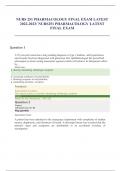
-
Package deal for NURS 251 Pharmacology Module Exam Files and Final Exam Files, All Answered With Complete Verified Solutions 100%
- Package deal • 10 items • 2023
-
- $30.49
- + learn more
NURS 251 PHARMACOLOGY FINAL EXAM LATEST 2022-2023/ NURS251 PHARMACOLOGY LATEST FINAL EXAM NURS 251 FINAL EXAM Pharmacology NURS 251 Module 1 Exam portage learning Newest Questions and Answers (2023 / 2024) (Verified Answers) Pharmacology NURS 251 Module Exam 8 portage learning A Questions and Answer Pharmacology NURS 251 Module Exam 7 portage learn
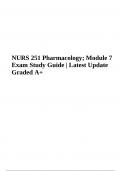
-
NURS 251 Pharmacology; Module 7 Exam Study Guide | Latest Update Graded A+
- Exam (elaborations) • 14 pages • 2023
- Available in package deal
-
- $18.49
- + learn more
NURS 251 Pharmacology; Module 7 Exam Study Guide | Latest Update Graded A+. Describe the pathophysiology of GERD. Pathophysiology of GERD involves the lower esophageal sphincter (LES) or valve at the bottom of the esophagus going into the stomach. This valve loosens such that the gastric acid is able to go back up (reflux) into the esophagus Question 3 What are the components of the quadruple therapy when referring to H. Pylori treatment regimen? two antibiotics, Pepto-Bismol, and a PPI. Q...

How much did you already spend on Stuvia? Imagine there are plenty more of you out there paying for study notes, but this time YOU are the seller. Ka-ching! Discover all about earning on Stuvia


